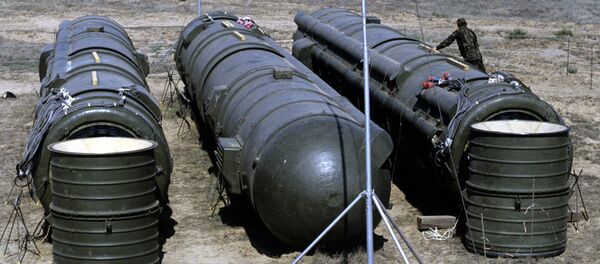On Monday, Politico reported that US lawmakers sent a proposal to the White House urging the administration to withdraw from the INF arms control treaty that was negotiated by President Ronald Reagan and President of the Soviet Union Mikhail Gorbachev in 1987.
"This is alarming news, and signifies the growing arrogance of neoconservative policymakers and the increasing fearfulness among the military industrial complex that the US taxpayer is losing interest in funding losing wars," Kwiatkowski said on Monday.
Kwiatkowski warned that any unilateral withdrawal from the treaty by the United States could have grave and unpredictable consequences.
"To casually withdraw from a longstanding and legally ratified treaty can be dangerous and ill-conceived, most especially one relating to limiting nuclear arms," Kwiatkowski said.
The INF Treaty, Kwiatkowski claimed, was probably Reagan’s greatest achievement, one that he was able to accomplish in spite of vicious and bitter neoconservative opposition among both parties that has persisted in Washington.
The attack on the treaty was part of the ongoing efforts over the past year to politically block and destroy President Donald Trump and to demonize Russia in order to prevent the president from fulfilling his campaign agenda to remove conflicts and tensions with Moscow, Kwiatkowski explained.
"Sectors of the [US] energy industry seek sanctions against Russian oil and gas, and the military industrial complex is concerned Trump will reverse his current course and stand up for his promise of reducing US interventionism abroad, hence shrinking their market and political clout," she noted.
Kwiatkowski described the INF agreement as "a focused, bilateral and very specific treaty" that has been observed for nearly 30 years.
"As a treaty it has clear language instructing the signatories in case of disagreement or violation of terms," she said.
Senator Tom Cotton, described by Kwiatkowski as "a neoconservative first-termer," has introduced a bill demanding $500 million in new additional spending for active defenses against purported Russian INF capability, as well as counterforce and countervailing strike capabilities.
Those measures, "if funded and pursued would place the US in direct violation of the INF treaty before even attempting to deal with any Russian variances," Kwiatkowski warned.
Cotton’s bill asserts that Russia has violated the INF Treaty. However, this claim "is mainly based on various State Department reports and a few selected statements by non-intelligence military leadership," Kwiatkowski pointed out.
Kwiatkowski also noted that Cotton’s bill refers the US Conventional Prompt Global Strike (CPGS) program, which has been advocated for by hawkish US think tanks for several years.
The entities of the US military-industrial-congressional complex are willing to appropriate vast new sums of moneys from the Treasury on the gamble that Trump enjoys vacating treaties, Kwiatkowski warned.
The 1987 treaty prohibits the development, deployment or testing of ground-launched ballistic or cruise missiles with ranges between 300 and 3,400 miles. Russia is party to the INF treaty, as the Soviet Union's successor state. The treaty was implemented in 1991, with inspections continuing until 2001.
Russian Foreign Minister Sergey Lavrov has repeatedly said that Moscow was in full compliance with the INF treaty. According to Lavrov, Moscow had its own concerns over Washington's compliance with the INF Treaty and that the Russian side had repeatedly called on US partners to substantially discuss the most controversial points related to the agreement's implementation.
In February, US media reported that Russia had deployed nuclear cruise missiles in violation of the INF Treaty. In March, US Joint Chiefs of Staff Vice Chairman Gen. Paul Selva said in a congressional testimony that the United States aims to "look for leverage points" seeking Russia's compliance with the treaty.



